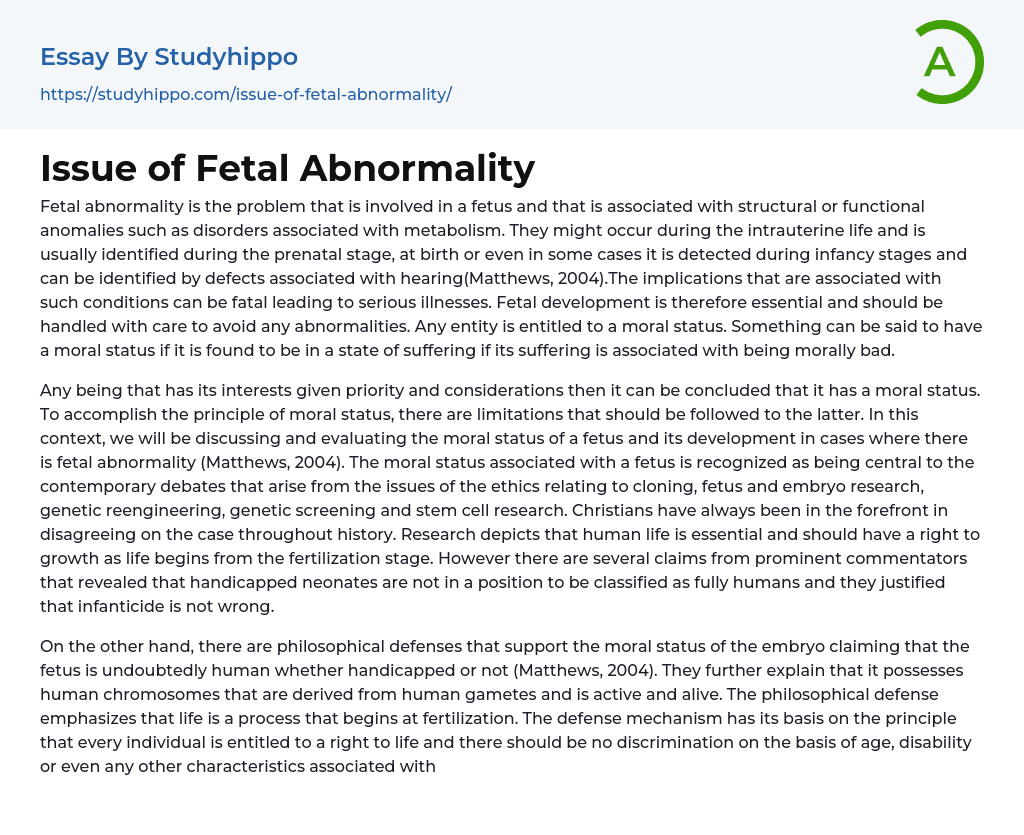Fetal abnormality refers to structural or functional anomalies in a developing fetus. These anomalies may include disorders related to metabolism.
During the intrauterine life, conditions that can lead to defects in hearing may be identified prenatally, at birth, or during infancy (Matthews, 2004). These conditions have serious implications and can result in fatal illnesses. It is crucial to ensure proper fetal development to prevent abnormalities. All entities have a moral status, which is determined by their capacity for suffering and whether that suffering is morally problematic.
When any being's interests are prioritized and given consideration, it can be concluded that they possess moral status. Adhering to certain limitations is necessary to uphold the principle of moral status. This discussion focuses on evaluating the moral status of a fetus and its development in instances of fetal abnormality (Matthews, 2004). The moral status
...associated with a fetus is integral to ongoing debates surrounding ethical matters such as cloning, research on fetuses and embryos, genetic reengineering, genetic screening, and stem cell research. Christians have consistently opposed these practices throughout history.
Research suggests that human life should be valued and allowed to develop from the moment of fertilization. Some commentators, however, argue that it is morally acceptable to kill newborns with disabilities as they are not considered fully human. On the contrary, there are philosophical arguments supporting the moral status of unborn children. These arguments emphasize that a fetus is undoubtedly human, regardless of any disabilities, due to possessing human chromosomes from human gametes and being actively alive. Additionally, they highlight that life begins at fertilization. This defense mechanism operates on the principle that every individual has the right to life, irrespective
of age, disability, or any other biological characteristics.
Jessica and Marco, a young couple who have been living in the US for three years, intend to save money from their jobs before moving into their own house (Matthews, 2004). Unfortunately, Jessica becomes aware of her pregnancy six months prior to their planned move. As a result, four months later, they opt to seek medical care at a hospital for the duration of her pregnancy and childbirth. During an initial ultrasound examination, doctors discover an anomaly in the fetus that Jessica is carrying. Concerned about this discovery, the doctors decide to conduct additional scans in order to evaluate the severity of the fetal abnormality.
The scans revealed that the fetus has a rare condition causing the absence of arm development, with no chance of future growth. Furthermore, there is a high probability of Down syndrome in the fetus (Matthews, 2004). It is Jessica's initial doctor visit and the outcome is unfavorable. Despite Jessica's husband's plea to withhold the scan results from her, it is the doctor's obligation to inform their patients. Upon hearing this heartbreaking news, Aunt Maria becomes overwhelmed with distress and cries while praying.
The doctor, named Wilson, is prepared to discuss various options regarding safety including the possibility of abortion. Doctor Wilson speaks to Jessica and explains her unfortunate situation, outlining all the factors that can be considered as alternatives. He recommends abortion as the best course of action based on the expected quality of life for a child born with fetal abnormalities (Matthews, 2004).
In contrast, Jessica is determined to keep her first child and embrace motherhood. She holds the belief that all life is
sacred, aligning with Christian teachings. Marco, her husband, supports whatever decision she makes but expresses his unwillingness to raise a disabled child due to its potential impact on economic independence and personal growth.
The doctor believes that abortion is the best scientifically supported option in this scenario, but Aunt Maria believes in allowing the pregnancy to continue and trusting in God's plan (Matthews, 2004).
Reference
- Matthews, G. B. (2004). The philosophy of childhood. Cambridge, Mass. u.a.: Harvard Univ. Press.




